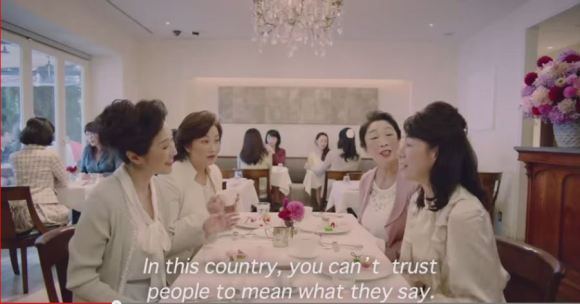
Unintentional cultural misunderstandings became the subject of great debate in Japan recently following a new round of commercials produced for cup noodle manufacturer Nissin. Although intended to be entirely tongue-in-cheek, some people have raised the issue that it is precisely these kinds of advertisements that compound incorrect notions about a country and lead to further stereotyping, which led to a survey being taken which asked Japanese to list the things that they perceive to be the most common stereotypes about their own culture.
Think you can guess what made the list? Keep reading after the jump to find out!
Earlier this year, I gave a presentation about Japan to a class of 20-something American fifth graders. I started off by asking, “What comes to mind when you think of Japan?” The answers, as you might expect, were all along the lines of samurai, ninja and Hello Kitty. “OK, great ideas,” I replied. “Now, can you tell me what kinds of foods Japanese people eat every day?” “Sushi!” the kids shouted. “How about what they wear on a typical day?” “Oh, it’s a kimono, right?”
In the above case, the children were convinced that Japanese people eat nothing but sushi on a daily basis, when in reality, good-quality sushi is expensive and consumed mainly when dining out. Similarly, they were shocked to learn that Japanese people wear the same kinds of jeans, shirts, and Western-style clothing as we do, and that traditional clothing is worn only on special occasions. I probably don’t have to tell you that a large number of the kids also believed samurai and ninja are still out there, battling their days away…
If the above anecdote both amused you and made you cringe, you might find it hard to watch the newest commercial in Nissin’s “SAMURAI, FUJIYAMA, CUPNOODLE” campaign. After previously touching upon the subjects of idols, manga, and football-playing samurai in Brazil, the third series of commercials began airing in October and introduces the concepts of hon’ne [本音] and tatemae [建前]. These two concepts are usually rendered into English as something like “one’s true intention/motive” and “one’s public face/attitude,” but like any culturally related terms, are much more complex than a simple definition.
However, some Japanese people have begun questioning this latest series of commercials about hon’ne and tatemae and how they portray Japanese people, specifically from a foreigner’s perspective. Are these commercials only perpetuating already deep-rooted stereotypes about Japanese people? Will foreigners misinterpret the tongue-in-check message within?
Take a moment to watch the commercial in question, which conveniently already provides English subtitles:
Do you feel like the writers went too far, and that foreigners with little or no knowledge of Japan will be mislead by the subtitles about hon’ne and tatemae?
As previously mentioned, Yahoo! Japan also reported the results from a survey of 200 Japanese working men in their 20s or 30s which explored the misconceptions that people around the world have about the Japanese. Participants could submit three replies–their first reply was worth three points, the second was worth two points, and the third was worth only one point. Keep in mind that these responses show which misconceptions Japanese people believe foreigners have about the Japanese people, and not what foreigners themselves think.
Here are the results of the survey, ranked in order of most points to least:
“The top 10 things that Japanese people think foreigners misunderstand about Japanese”
1. All Japanese men have the spirit of the samurai (238 points)
2. All Japanese people like working diligently (147 points)
3. All Japanese men wear topknots (108 points)
4. All Japanese people like working collectively (96 points)
5. All Japanese people eat only sushi and tempura (83 points)
6. All Japanese people like lining up (78 points)
7. All Japanese people wear kimono all the time (69 points)
8. All Japanese people love anime and manga (67 points)
9. All Japanese people are pros at using technology (54 points)
10. All Japanese people live in houses with tatami and shoji (paper sliding doors) (49 points)
Now, let’s take a look at the top five responses in greater depth:
1. All Japanese men have the spirit of the samurai (238 points)
“Samurai are very recognizable to foreigners as a symbol of Japan.” (25-year-old)
“When people overseas are introduced to Japan, they typically see historical pictures of samurai, etc.” (26-year-old)
“The word ‘samurai’ can stand on its own.” (29-year-old)
“I myself have no clue what ‘having a samurai spirit’ means.” (29-year-old)
2. All Japanese people like working diligently (147 points)
“If I could manage to get by by working only moderately, I wouldn’t want to work hard.” (29-year-old)
“The idea that ‘working overtime is good’ took root with salarymen.” (26-year-old)
“Slackers really do slack, even if they’re Japanese!” (29-year-old)
“There are a lot of people doing unpaid overtime.” (27-year-old)
3. All Japanese men wear topknots (108 points)
“Topknots are virtually nonexistent nowadays, so don’t get the wrong idea!” (26-year-old)
“Apart from sumo wrestlers, I’ve never seen someone with a topknot.” (26-year-old)
“They must be watching too many historical dramas.” (28-year-old)
“That’s a severe anachronism.” (25-year-old)
4. All Japanese people like working collectively (96 points)
“There are lots of people who don’t like collective action.” (29-year-old)
“There are people who don’t necessarily like working together, but they just do it because it’s logical.” (29-year-old)
“They’re just flocking together because they feel uneasy when alone. There are very few groups that take true collective actions.” (21-year-old)
“Many people follow a group organizational structure at work, but actually like solitude outside of work.” (27-year-old)
5. All Japanese people eat only sushi and tempura (83 points)
“They think everything we eat is healthy.” (26-year-old)
“Maybe it’s because Japanese food is so popular around the world, but there are many foreigners who think that Japanese people eat only Japanese food.” (28-year-old)
“It’s like the image that Americans eat only hamburgers; it can’t be helped.” (26-year-old)
“It would be unhealthy if we ate only those things.” (27-year-old)
The whole premise of Japanese people thinking about misconceptions about themselves seems a bit strange to us. We think it would be interesting to poll a bunch of foreigners to see how their images of Japanese people stack up against the Japanese people’s own ideas. In the meantime, we’re looking forward to whatever crazy antics Nissin features in their next round of cup noodle commercials…
Source: Yahoo! Japan
Images: YouTube (Nissin Group)

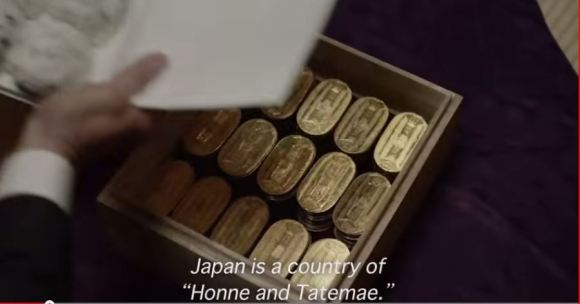
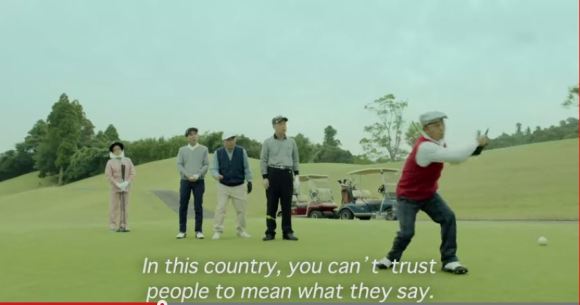
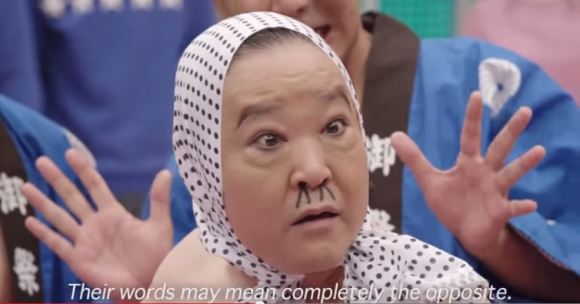
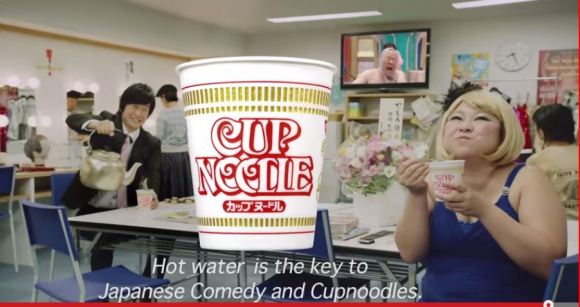
 What do Japanese men think about dating foreign women?【Video】
What do Japanese men think about dating foreign women?【Video】 Epic ad for instant ramen noodles shows all the great Japanese trends from the past year
Epic ad for instant ramen noodles shows all the great Japanese trends from the past year 5 common misconceptions most westerners have about Japanese food
5 common misconceptions most westerners have about Japanese food Honne vs Tatemae: When do Japanese people lie and when do they reveal their true feelings?
Honne vs Tatemae: When do Japanese people lie and when do they reveal their true feelings? Revealed! Japan’s top 10 handsome samurai【Photos】
Revealed! Japan’s top 10 handsome samurai【Photos】 Yakuzen ramen restaurant in Tokyo is very different to a yakuza ramen restaurant
Yakuzen ramen restaurant in Tokyo is very different to a yakuza ramen restaurant Tokyo Skytree turns pink for the cherry blossom season
Tokyo Skytree turns pink for the cherry blossom season Over 700 photos of men undressing! Because what manga artist doesn’t draw half-naked men, right?
Over 700 photos of men undressing! Because what manga artist doesn’t draw half-naked men, right? Burning through cash just to throw things away tops list of headaches when moving house in Japan
Burning through cash just to throw things away tops list of headaches when moving house in Japan Japan Snow Battle Federation looking to make snowball fights Olympic event
Japan Snow Battle Federation looking to make snowball fights Olympic event Nintendo and Lego team up for an awesomely accurate the Lego Game Boy kit【Photos】
Nintendo and Lego team up for an awesomely accurate the Lego Game Boy kit【Photos】 Stylish, green and eco-friendly modern urban village to be built in the heart of Tokyo by 2023
Stylish, green and eco-friendly modern urban village to be built in the heart of Tokyo by 2023 Majority of Japanese women in survey regret marrying their husband, but that’s only half the story
Majority of Japanese women in survey regret marrying their husband, but that’s only half the story Super-salty pizza sends six kids to the hospital in Japan, linguistics blamed
Super-salty pizza sends six kids to the hospital in Japan, linguistics blamed Tokyo Station staff share their top 10 favorite ekiben
Tokyo Station staff share their top 10 favorite ekiben The 10 most annoying things foreign tourists do on Japanese trains, according to locals
The 10 most annoying things foreign tourists do on Japanese trains, according to locals Starbucks Japan releases new sakura goods and drinkware for cherry blossom season 2026
Starbucks Japan releases new sakura goods and drinkware for cherry blossom season 2026 Naruto and Converse team up for new line of shinobi sneakers[Photos]
Naruto and Converse team up for new line of shinobi sneakers[Photos] Is Sapporio’s Snow Festival awesome enough to be worth visiting even if you hate the snow? [Pics]
Is Sapporio’s Snow Festival awesome enough to be worth visiting even if you hate the snow? [Pics] Japan has trams that say “sorry” while they ride around town…but why?
Japan has trams that say “sorry” while they ride around town…but why? Sakura Totoro is here to get spring started early with adorable pouches and plushies
Sakura Totoro is here to get spring started early with adorable pouches and plushies Starbucks Japan unveils new sakura Frappuccino for cherry blossom season 2026
Starbucks Japan unveils new sakura Frappuccino for cherry blossom season 2026 Poop is in full bloom at the Unko Museums for cherry blossom season
Poop is in full bloom at the Unko Museums for cherry blossom season Now is the time to visit one of Tokyo’s best off-the-beaten-path plum blossom gardens
Now is the time to visit one of Tokyo’s best off-the-beaten-path plum blossom gardens Playing Switch 2 games with just one hand is possible thanks to Japanese peripheral maker
Playing Switch 2 games with just one hand is possible thanks to Japanese peripheral maker Japan’s newest Shinkansen has no seats…or passengers [Video]
Japan’s newest Shinkansen has no seats…or passengers [Video] Foreigners accounting for over 80 percent of off-course skiers needing rescue in Japan’s Hokkaido
Foreigners accounting for over 80 percent of off-course skiers needing rescue in Japan’s Hokkaido Foreign tourists in Japan will get free Shinkansen tickets to promote regional tourism
Foreign tourists in Japan will get free Shinkansen tickets to promote regional tourism Take a trip to Japan’s Dododo Land, the most irritating place on Earth
Take a trip to Japan’s Dododo Land, the most irritating place on Earth Archfiend Hello Kitty appears as Sanrio launches new team-up with Yu-Gi-Oh【Pics】
Archfiend Hello Kitty appears as Sanrio launches new team-up with Yu-Gi-Oh【Pics】 Survey asks foreign tourists what bothered them in Japan, more than half gave same answer
Survey asks foreign tourists what bothered them in Japan, more than half gave same answer Japan’s human washing machines will go on sale to general public, demos to be held in Tokyo
Japan’s human washing machines will go on sale to general public, demos to be held in Tokyo Starbucks Japan releases new drinkware and goods for Valentine’s Day
Starbucks Japan releases new drinkware and goods for Valentine’s Day We deeply regret going into this tunnel on our walk in the mountains of Japan
We deeply regret going into this tunnel on our walk in the mountains of Japan Studio Ghibli releases Kodama forest spirits from Princess Mononoke to light up your home
Studio Ghibli releases Kodama forest spirits from Princess Mononoke to light up your home Major Japanese hotel chain says reservations via overseas booking sites may not be valid
Major Japanese hotel chain says reservations via overseas booking sites may not be valid Put sesame oil in your coffee? Japanese maker says it’s the best way to start your day【Taste test】
Put sesame oil in your coffee? Japanese maker says it’s the best way to start your day【Taste test】 No more using real katana for tourism activities, Japan’s National Police Agency says
No more using real katana for tourism activities, Japan’s National Police Agency says 10 things foreigners do that Japanese people find amusing
10 things foreigners do that Japanese people find amusing Top 10 things even Japanese people think they’re too obsessive about
Top 10 things even Japanese people think they’re too obsessive about Five Japanese misconceptions about foreign male/Japanese female couples
Five Japanese misconceptions about foreign male/Japanese female couples 11 predictions Japanese people made hundreds of years ago about the future
11 predictions Japanese people made hundreds of years ago about the future New commercial shows people in Japan offending foreigners with their stinky breath【Video】
New commercial shows people in Japan offending foreigners with their stinky breath【Video】 10 things foreigners in Japan notice about Japanese phone culture
10 things foreigners in Japan notice about Japanese phone culture Japanese people give their thoughts on Gaijin Hunters/English Vampires
Japanese people give their thoughts on Gaijin Hunters/English Vampires Our Korean-Japanese reporter’s thoughts on people asking “Is Naomi Osaka really Japanese?”
Our Korean-Japanese reporter’s thoughts on people asking “Is Naomi Osaka really Japanese?” Survey Among Expats in Japan: What Did You Think About Japan Before You Started Living Here?
Survey Among Expats in Japan: What Did You Think About Japan Before You Started Living Here? Renowned Japanese calligraphy teacher ranks the top 10 kanji that foreigners like
Renowned Japanese calligraphy teacher ranks the top 10 kanji that foreigners like Even Japanese people are frightened by the concealed anger in Kyoto compliment foreigner received
Even Japanese people are frightened by the concealed anger in Kyoto compliment foreigner received Foreign tourists pick the top 10 inconveniences about traveling in Japan【Survey】
Foreign tourists pick the top 10 inconveniences about traveling in Japan【Survey】 Three misconceptions guys have about how to be popular with the ladies
Three misconceptions guys have about how to be popular with the ladies The top 10 words to describe Japanese people (according to foreigners)
The top 10 words to describe Japanese people (according to foreigners) Foreigner delights Japanese netizens with hilarious video about Japanese washlet toilets
Foreigner delights Japanese netizens with hilarious video about Japanese washlet toilets